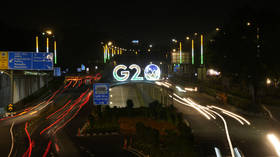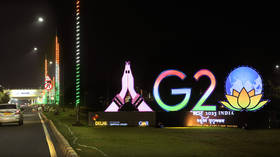Fyodor Lukyanov: The glory years of the G20 are over
As both Xi and Putin skip this year’s summit in India, it’s clear the status of the forum has diminished. It will not disappear, but the veneer of ‘world government’ attached to the group will dissipate

The annual G20 summit is taking place in India this weekend. Any gathering of leaders of this caliber (and the 20 largest economies are the ones that really run the world) is a major event. All the more so because, in the context of the apparent weakening of traditional institutions in recent decades, the G20 has been seen as the prototype for a new structure of international governance. Without detracting from the importance of the forthcoming forum, it can be suggested that the group has already passed its peak and that the further evolution of the world system will contribute to the strengthening of other structures.
The G20 is the product of the economic setbacks of the advanced globalization era of the late 20th and early 21st centuries. It emerged at the level of finance ministers and central bank governors in response to the Asian financial crisis of 1997-1998. But it really took off ten years later, when member states came together in emergency mode to quell the panic caused by the collapse of US financial institutions and the ensuing global financial crisis. Since then, the G20 has been at the center of the international political-economic architecture.
The reasons for this are compelling. First, the official focus is on finance, trade, and economic concerns, which has so far allowed the growing political tensions between the largest participants to be circumvented. Second, the criterion by which the group is composed is the closest to what can be considered objective – the size of their economies. However, these two factors suffered most when the international situation deteriorated sharply.
The upheaval that occurred in 2022, but had been brewing for some time, has changed the international hierarchy. Politics has finally overtaken economics. The expediency embedded in the concept of liberal globalization (above all, it must be cost-effective) has given way to considerations of strategic confrontation. The main issue now is the West versus Russia, although a US-China showdown is also on the way. In general, the institutions that ensured relative compliance with general economic rules are clearly not in the best shape, as the political needs of the largest countries outweigh any written order.
We can add specific personal reasons why, for example, Vladimir Putin and Xi Jinping will not travel to the G20 summit, but that is not the point. Globalization in the form it existed for the last three decades or so is over. As a result, attitudes to the structures that were previously in demand are bound to change. This does not mean that the G20 as such will disappear – the meeting of the world’s largest economies is valuable in itself, and there will always be some benefit. But the veneer of ‘world government’ will disappear. Again, it is not about the confrontation of one country against another, but about the approach itself – grandees getting together to agree on something that affects everyone. From now on, agreements will be much more substantive and will involve a narrower circle of countries – those directly affected by a particular issue.
Are there associations that are strengthened under these conditions? There are. First of all, there is the group of states now commonly referred to as the ‘collective West’. The last two years have shown that the potential for the political consolidation of the US and its allies is quite sufficient for unity, even against the economic interests of the participants. It is impossible to say how long this will last, but for the moment the cementing of the alliance is evident. The more problematic the economic consequences appear, the more rigid the value-ideological discipline will have to be. The pile on against one adversary, Russia, deliberately reduces flexibility towards another potential enemy, China. At the very least, Western European attempts to pursue an independent, economically motivated course in the direction of Beijing will not meet with US understanding. If such efforts continue, there will be direct opposition.
However, there is another community that is not as consolidated as the West, but which has begun to find ways of uniting interests. It goes by various names – from the World Majority to the Global South – but the meaning is clear: it comprises those who are not part of the system of binding relations with Washington. By definition, there can be no value-ideological unity in this group of states – it is extremely heterogeneous. However, the formation of a blurred but nonetheless common identity, not in opposition to the West but parallel to it, is already taking place. In this sense, the outcome of the recent BRICS summit, which opted for widening membership rather than deepening existing links, is significant. It will not be possible to structure this majority anyway, but the creation of an expanding space of interaction beyond the West is in the interests of all. The alternative means an additional opportunity, and there is every reason to believe that this trend will gain momentum rather quickly.
Could the G20 be a meeting place for these two communities? In theory, yes. But why? Both ‘collectives’ are primarily concerned with self-development. As for interests that overlap with those of the West, they will be dealt with at the level of the countries concerned, each of which has a different set of priorities.
This state of affairs will not last forever, but for the time being the G20 will be more symbolic than practical.
https://www.rt.com/news/582578-india-g20-putin-xi/



0 Comments:
Post a Comment
Subscribe to Post Comments [Atom]
<< Home